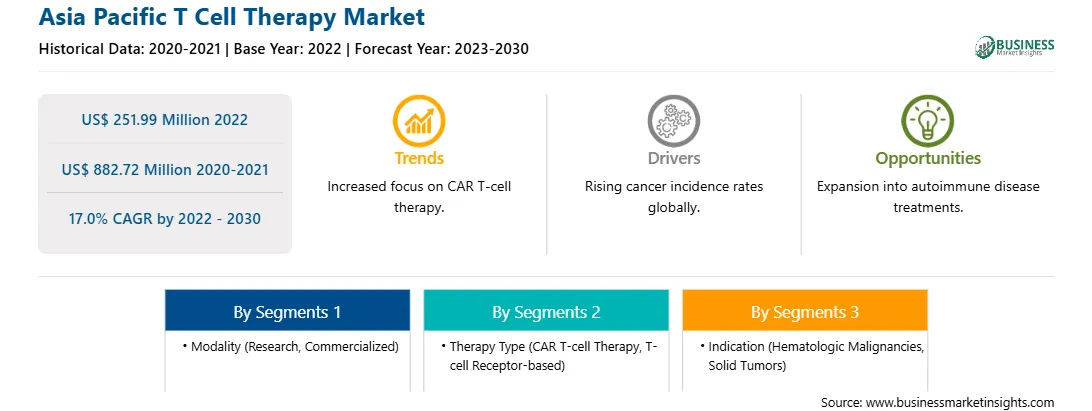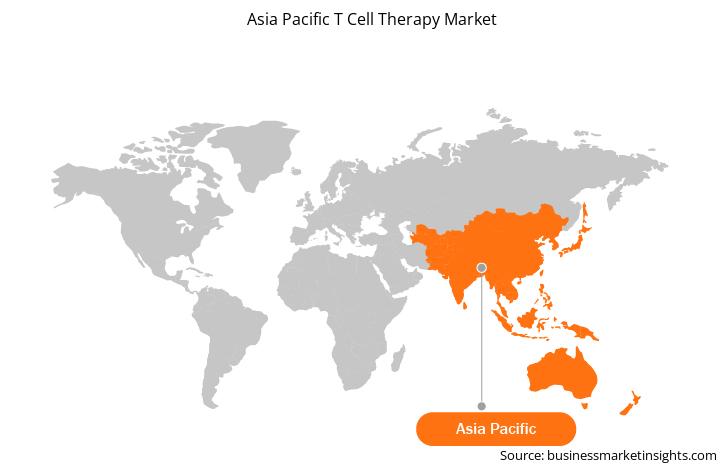Targeted treatment, faster and more efficient recovery, and reduced side effects are among the advantages of t cell therapy. Globally, cell therapies are widely adopted owing to the availability of various approvals. For instance, in 2023: Janssen's CAR-T cell therapy CARVYKTI (Ciltacabtagene Autoleucel) has been approved as a fourth-line treatment for multiple myeloma patients by the Therapeutic Goods Administration, Australia.
In 2023: The Chinese National Medical Products Administration has approved the use of Fucaso (equecabtagene autoleucel) by Innovent Biologics and IASO Biotechnology (IASO Bio) for the treatment of adult patients with relapsed or refractory multiple myeloma (RRMM). In June 2023, the agency approved the therapy's new drug application (NDA).
In 2023: The first humanized CD19-targeted Chimeric Antigen Receptor T cell (CAR-T cell) therapy product, NexCAR19 (Actalycabtagene autoleucel), has been approved by the Central Drugs Standard Control Organization (CDSO) for use in cases of relapsed/refractory B-cell lymphomas and leukemia in India. Immuno Adoptive Cell Therapy is incubated at IIT Bombay.
In 2023: Yikaida (axicabtagene ciloleucel), an autologous CAR T-cell therapy developed by Fosun Kite Biotechnology, was granted approval by China's National Medical Products Administration (NMPA) for use as a second-line treatment for patients with large B-cell lymphoma.
In 2020: The Ministry of Health, Labor and Welfare (MHLW) of Japan has granted the Foundation for Biomedical Research and Innovation at Kobe ("FBRI") a marketing license to produce and distribute Kymriah (tisagenlecleucel) for patients in Japan. Novartis made this announcement today. With this clearance, FBRI is now the only authorized commercial manufacturing facility in Asia for CAR-T cell therapy.
Thus, the increasing number of approvals for T-cell therapy is fueling the market growth.
The Asia Pacific T-cell therapy market is segmented into China, Japan, India, South Korea, Australia, and the Rest of Asia Pacific. The market in Asia Pacific is expected to witness significant growth as CAR T-cell therapy is efficient in treating cancer, elevating the market growth in the region. Many clinical trials for CAR T-cell therapy are ongoing in the region, offering new opportunities in APAC. China is the largest country in the world for CAR T-cell clinical trials, which hospitals conduct. The CAR-T industry chain is being formed in China, including ongoing and expected regulatory reforms to benefit access to such novel therapies. China approved its first CAR T-cell therapy, relmacabtagene autoleucel of JW Therapeutics, in September 2021 for the treatment of adult patients with relapsed or refractory large B-cell lymphoma (r/r LBCL) after two or more lines of systemic therapy.
The Asia Pacific T cell therapy market is segmented into modality, therapy type, indication, and country.
Based on modality, the Asia Pacific T cell therapy market is bifurcated into research and commercialized. The commercialized segment held a larger market share in 2022.
Based on therapy type, the Asia Pacific T cell therapy market is divided into CAR T-cell therapy and T-cell Receptor (TCR)-based. The CAR T-cell therapy segment held a larger market share in 2022.
Based on indication, the Asia Pacific T cell therapy market is bifurcated into hematologic malignancies and solid tumors. The hematologic malignancies segment held the largest market share in 2022.
Based on country, the Asia Pacific T cell therapy market is segmented into China, Japan, Australia, South Korea, and the Rest of Asia Pacific. China dominated the Asia Pacific T cell therapy market in 2022.
Bristol-Myers Squibb Co, Gilead Sciences Inc, Innovent Biologics Inc, Janssen Global Services LLC, JW (Cayman) Therapeutics Co Ltd, Legend Biotech Corp, and Novartis AG are some of the leading companies operating in the Asia Pacific T cell therapy market.
Strategic insights for the Asia Pacific T Cell Therapy provides data-driven analysis of the industry landscape, including current trends, key players, and regional nuances. These insights offer actionable recommendations, enabling readers to differentiate themselves from competitors by identifying untapped segments or developing unique value propositions. Leveraging data analytics, these insights help industry players anticipate the market shifts, whether investors, manufacturers, or other stakeholders. A future-oriented perspective is essential, helping stakeholders anticipate market shifts and position themselves for long-term success in this dynamic region. Ultimately, effective strategic insights empower readers to make informed decisions that drive profitability and achieve their business objectives within the market.

| Report Attribute | Details |
|---|---|
| Market size in 2022 | US$ 251.99 Million |
| Market Size by 2030 | US$ 882.72 Million |
| Global CAGR (2022 - 2030) | 17.0% |
| Historical Data | 2020-2021 |
| Forecast period | 2023-2030 |
| Segments Covered |
By Modality
|
| Regions and Countries Covered | Asia-Pacific
|
| Market leaders and key company profiles |
The geographic scope of the Asia Pacific T Cell Therapy refers to the specific areas in which a business operates and competes. Understanding local distinctions, such as diverse consumer preferences (e.g., demand for specific plug types or battery backup durations), varying economic conditions, and regulatory environments, is crucial for tailoring strategies to specific markets. Businesses can expand their reach by identifying underserved areas or adapting their offerings to meet local demands. A clear market focus allows for more effective resource allocation, targeted marketing campaigns, and better positioning against local competitors, ultimately driving growth in those targeted areas.

1. Bristol-Myers Squibb Co
2. Gilead Sciences Inc
3. Innovent Biologics Inc
4. Janssen Global Services LLC
5. JW (Cayman) Therapeutics Co Ltd
6. Legend Biotech Corp
7. Novartis AG
The Asia Pacific T Cell Therapy Market is valued at US$ 251.99 Million in 2022, it is projected to reach US$ 882.72 Million by 2030.
As per our report Asia Pacific T Cell Therapy Market, the market size is valued at US$ 251.99 Million in 2022, projecting it to reach US$ 882.72 Million by 2030. This translates to a CAGR of approximately 17.0% during the forecast period.
The Asia Pacific T Cell Therapy Market report typically cover these key segments-
The historic period, base year, and forecast period can vary slightly depending on the specific market research report. However, for the Asia Pacific T Cell Therapy Market report:
The Asia Pacific T Cell Therapy Market is populated by several key players, each contributing to its growth and innovation. Some of the major players include:
The Asia Pacific T Cell Therapy Market report is valuable for diverse stakeholders, including:
Essentially, anyone involved in or considering involvement in the Asia Pacific T Cell Therapy Market value chain can benefit from the information contained in a comprehensive market report.